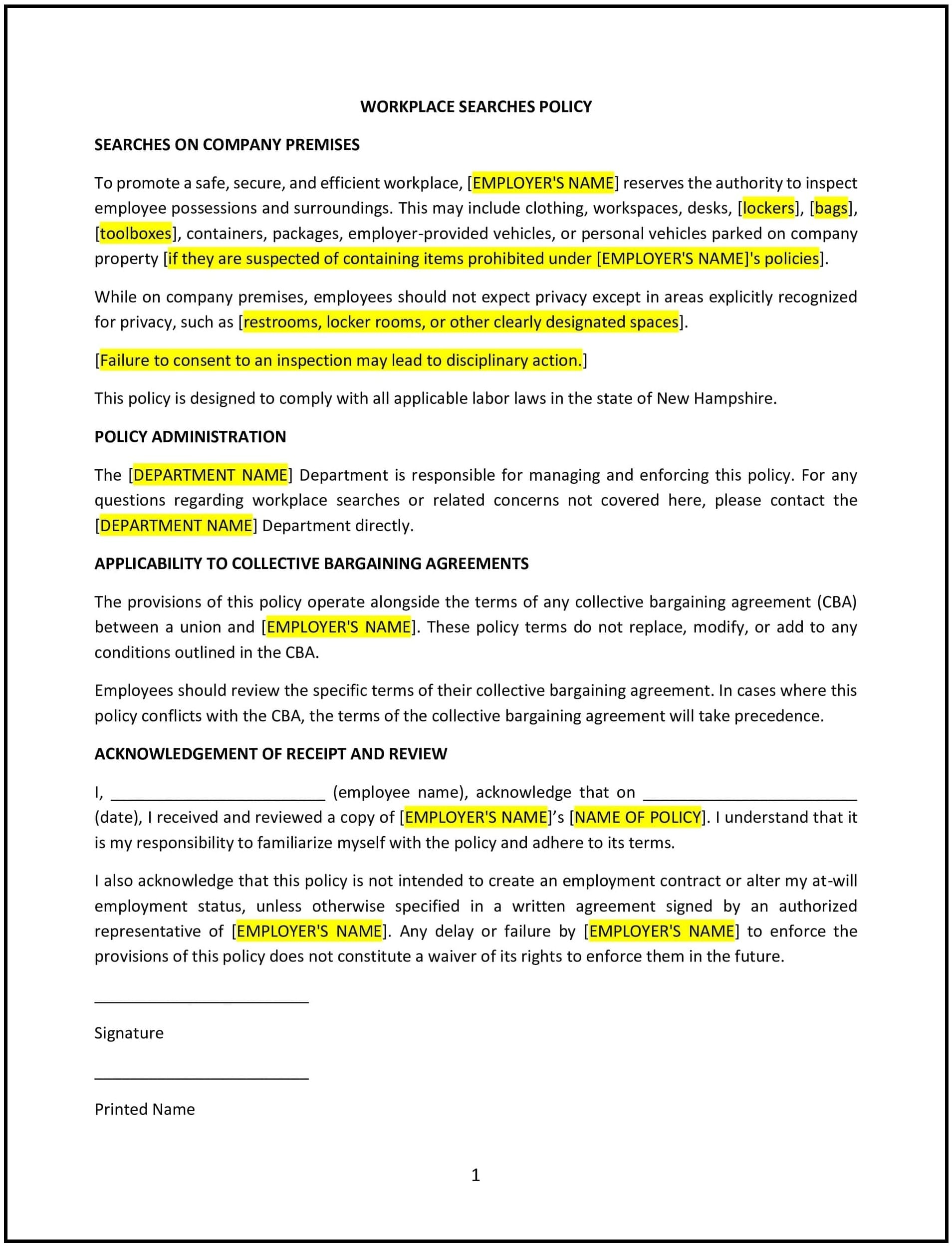Workplace searches policy (New Hampshire): Free template
Got contracts to review? While you're here for policies, let Cobrief make contract review effortless—start your free review now.

Customize this template for free
Workplace searches policy (New Hampshire): Free template
Workplace searches policy (New Hampshire)
A workplace searches policy helps New Hampshire businesses establish clear guidelines for conducting searches of employees' personal property, workspace, or company-owned property. This policy ensures that searches are done legally and respectfully, balancing the company's interests in safeguarding its property and maintaining a productive environment with employees’ privacy rights.
By implementing this policy, businesses can mitigate the risks associated with theft, workplace misconduct, and other security concerns while ensuring transparency and fairness in the search process.
How to use this workplace searches policy (New Hampshire)
- Define the scope of searches: Clearly specify which items or areas may be searched (e.g., lockers, desks, bags, personal devices, or vehicles). Be explicit about when and why searches may be conducted.
- Set clear guidelines for consent: Include provisions about obtaining employees' consent before conducting a search, particularly if it involves personal property. Outline circumstances under which consent may be implied or required.
- Establish circumstances for searches: Define the situations in which searches may be conducted, such as for security reasons, to enforce company policies, or when there is reasonable suspicion of policy violations (e.g., theft, substance abuse).
- Specify the search procedure: Detail the steps for conducting searches, including the involvement of supervisors or HR, maintaining privacy and dignity during searches, and any documentation required.
- Clarify who conducts searches: Indicate who is authorized to perform searches within the company, such as HR, security personnel, or direct supervisors, and ensure that only trained staff conduct searches.
- Address privacy considerations: Respect employee privacy during searches, ensuring that only necessary and non-invasive searches are conducted. Specify that searches should be done in a manner that minimizes discomfort.
- Outline the consequences of refusal: Describe the potential consequences if an employee refuses to cooperate with a search, which may include disciplinary action depending on the severity of the situation.
- Review and update: Regularly review and update the policy to ensure it aligns with changes in law, business needs, and best practices for maintaining a secure and respectful workplace.
Benefits of using this workplace searches policy (New Hampshire)
This policy provides several benefits for New Hampshire businesses:
- Protects company property: By enabling businesses to conduct searches when necessary, companies can safeguard their property, assets, and confidential information from theft or misuse.
- Reduces misconduct: The policy helps deter and address misconduct, including theft, drug use, or other violations of workplace rules, by establishing a clear framework for managing employee behavior.
- Promotes fairness and transparency: A clearly articulated searches policy promotes fairness by ensuring that employees understand the conditions under which searches may be conducted, preventing arbitrary or biased enforcement.
- Minimizes legal risk: By following clear and legally compliant procedures for searches, businesses can minimize the risk of legal challenges related to invasion of privacy or discrimination claims.
- Enhances workplace security: Regular and consistent enforcement of the policy helps maintain a safe and secure workplace, reducing risks of conflicts, theft, or other disruptive behaviors.
Tips for using this workplace searches policy (New Hampshire)
- Communicate the policy clearly: Ensure all employees are aware of the policy and understand their rights and responsibilities regarding workplace searches.
- Provide training: Train supervisors and HR personnel on how to conduct searches in a respectful and lawful manner, emphasizing the importance of privacy and dignity.
- Obtain consent when required: Ensure employees are informed about the search process and provide explicit consent when necessary.
- Document searches: Keep accurate records of any searches conducted, including the reasons for the search, the employees involved, and any findings. This documentation can help protect the business in the event of disputes.
- Regularly review the policy: Regularly assess the policy’s effectiveness, especially when changes in legal standards or business practices occur.